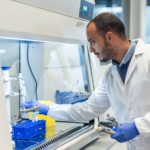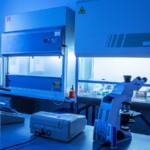Chemical Synthesis: From Lab to Industrial Scale
In the world of chemistry, the art of creating molecules through chemical synthesis is a fundamental and fascinating process. It’s a discipline that bridges the gap between laboratory-scale experiments and large-scale industrial production.
From the controlled environment of a research lab to the vast expanse of an industrial facility, chemical synthesis plays a pivotal role in various industries, including pharmaceuticals, chemicals, and materials science.
In this blog, we’ll take a journey through the science of chemical synthesis, exploring its key principles, methods, and the transition from lab-scale experiments to industrial-scale production.
1. Understanding Chemical Synthesis
1.1 What is Chemical Synthesis?
Chemical synthesis is the process of creating new compounds or molecules through chemical reactions. It’s a science that combines theoretical knowledge with practical skills to design, manipulate, and produce molecules with specific properties.
This process can involve the combination of different chemical compounds to form entirely new substances or the modification of existing molecules to enhance their characteristics.
1.2 The Art of Building Molecules
Chemical synthesis is essentially the art of building molecules. It’s akin to constructing intricate structures using a set of building blocks, each representing an atom or a group of atoms. This process involves a deep understanding of chemical reactions, reaction mechanisms, and the properties of various chemical compounds.
1.3 Pharmaceutical Discovery
In pharmaceutical research, chemical synthesis is at the heart of drug discovery. Medicinal chemists design and synthesize new molecules with the potential to become life-saving drugs. They meticulously craft molecular structures, introducing specific functional groups to optimize a compound’s pharmacological properties.
2. The Role of Laboratory-Scale Synthesis
2.1 Where the Journey Begins
Laboratory-scale synthesis is where the journey begins. In research labs, chemists explore new synthetic pathways, experiment with reaction conditions, and refine their understanding of the chemical processes involved. These experiments often start with small quantities of reagents and are meticulously controlled to ensure reproducibility.
2.2 The Creative Aspect
In the controlled environment of a laboratory, researchers have the freedom to experiment with novel reactions and explore uncharted chemical territories. This is where the creative aspect of chemical synthesis comes to the fore. Scientists design and conduct experiments to achieve specific outcomes, whether it’s the creation of a new chemical compound or the optimization of an existing one.
2.3 Objectives of Laboratory-Scale Synthesis
The primary objectives of laboratory-scale synthesis include:
- Discovery: Identifying new chemical compounds with desirable properties.
- Optimization: Fine-tuning reaction conditions to maximize yield and purity.
- Understanding: Gaining insights into reaction mechanisms and pathways.
Successful laboratory-scale synthesis sets the stage for further development and scale-up.
3. Scaling Up: Challenges and Considerations
3.1 The Transition to Industrial Scale
When a chemical synthesis route proves successful at the lab scale, the next step is to scale up production for industrial applications. This transition is not without its challenges. Factors like safety, efficiency, and scalability must be carefully considered. The goal is to maintain the quality of the product while increasing production volume.
3.2 Key Challenges
Scaling up from laboratory to industrial-scale synthesis is a significant milestone in the development of a chemical compound. However, it’s not a straightforward process. Several key challenges and considerations come into play:
- Safety: Safety becomes a more significant concern when dealing with larger quantities of chemicals. Protocols for handling, storage, and disposal must be rigorously followed to prevent accidents and ensure worker safety.
- Efficiency: Achieving the same level of efficiency as in the lab on a larger scale can be challenging. Reaction kinetics, heat transfer, and mass transfer become more complex in industrial reactors. Engineers must optimize process conditions to maximize yield and minimize waste.
- Scalability: Not all chemical reactions can be easily scaled up. Some may exhibit different behavior at larger scales due to factors like heat dissipation, mixing, or pressure. Identifying and addressing these issues is crucial.
- Quality Control: Maintaining product quality is non-negotiable. Rigorous quality control measures are implemented to ensure that the product meets specifications and regulatory requirements.
4. Industrial-Scale Chemical Synthesis
4.1 The Final Stage
In industrial settings, chemical synthesis is conducted on a much larger scale. This requires specialized equipment, controlled environments, and stringent quality control measures. The objective is to produce chemicals, intermediates, or final products in quantities that meet market demands while adhering to regulatory standards.
4.2 Production Capacity
Industrial facilities are designed to produce chemicals at a significantly higher volume than research labs. This may involve continuous manufacturing processes, batch production, or a combination of both.
4.3 Specialized Equipment
Specialized reactors, pumps, and instrumentation are used in industrial-scale synthesis. These are designed to handle large quantities of chemicals and maintain precise control over reaction conditions.
4.4 Quality Assurance
Quality control protocols are rigorously enforced to ensure product consistency and compliance with regulatory standards. This includes extensive testing and analysis at various stages of production.
4.5 Regulatory Compliance
Industrial-scale chemical synthesis must adhere to a host of regulatory requirements, including safety, environmental impact, and product quality. Compliance with Good Manufacturing Practices (GMP) is often mandatory.
5. Applications Across Industries
5.1 Versatility of Chemical Synthesis
Chemical synthesis finds applications across diverse industries. In the pharmaceutical sector, it’s crucial for drug discovery and production. In the chemical industry, it’s used to manufacture a wide range of products, from plastics to specialty chemicals. In materials science, it contributes to the creation of innovative materials with unique properties.
5.2 Pharmaceutical Advancements
The versatility of chemical synthesis extends its influence into various domains:
- Pharmaceuticals: Pharmaceutical companies rely on chemical synthesis to produce active pharmaceutical ingredients (APIs), the core components of medications. It’s a vital step in drug development and manufacturing.
- Chemicals: The chemical industry encompasses a broad spectrum of products, from commodity chemicals to specialty chemicals. Chemical synthesis is at the heart of this sector, producing everything from detergents to polymers.
- Materials Science: Chemical synthesis enables the creation of advanced materials with specific properties. This includes materials used in electronics, aerospace, and renewable energy technologies.
- Agrochemicals: The development of pesticides, herbicides, and fertilizers relies on chemical synthesis to produce effective and safe products for agriculture.
Summary
The science of chemical synthesis takes us on a journey from the controlled experiments of a laboratory to the expansive landscapes of industrial production. It’s a science that combines creativity with precision, theory with practice, and innovation with regulation.
As we navigate this journey, we gain insights into the art of creating molecules, the challenges of scale-up, and the myriad applications that shape our world. Chemical synthesis is more than a scientific discipline; it’s a gateway to discovery, innovation, and progress in countless industries.
Comments are closed.











